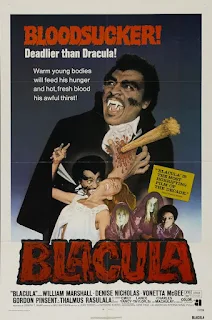TRASH IN MY EYE No. 47 of 2023 (No. 1936) by Leroy Douresseaux
Blacula (1972)
Running time: 93 minutes (1 hour, 33 minutes)
MPAA – PG
DIRECTOR: William Crain
WRITERS: Joan Torres and Raymond Koenig
PRODUCER: Joseph T. Naar
CINEMATOGRAPHER: John M. Stevens (D.o.P.)
EDITOR: Allan Jacobs
COMPOSER: Gene Page
BLAXPLOITATION/HORROR/ROMANCE
Starring: William Marshall, Vonetta McGee, Denise Nicholas, Thalmus Rasulala, Gordon Pinsent, Charles Macaulay, Emily Yancy, Lance Taylor, Sr., Ted Harris, Rick Metzler, Logan Field, Ketty Lester, Elisha Cook, Jr., Jitu Cumbuka, Eric Brotherson, and The Hues Corporation
Blacula is a 1972 American blaxploitation vampire horror and romance film directed by William Crain. Originally released by American International Pictures, the film was a hit and inspired a wave of blaxploitation (black exploitation) films, including its own sequel, Scream Blacula Scream. Blacula focuses on an 18th century African prince-turned-vampire who awakens to find himself in modern day Los Angeles.
Blacula opens in 1780, in Transylvania at Castle Dracula. The African prince, Mamuwalde (William Marshall), has traveled there with his wife, Luva (Vonetta McGee), to seek the help of Count Dracula (Charles Macaulay) in suppressing the African slave trade. Dracula refuses and after some insults and violence, he bites Mamuwalde and curses him to an immortal existence as the vampire, “Blacula.” He imprisons Mamuwalde in a sealed coffin in a crypt hidden beneath the castle, where he also leaves Luva to die.
In 1972, Blacula emerges from his coffin and begins a reign of terror and death. However, he is shocked to discover a young woman named Tina Williams (Vonetta McGee) who looks exactly like his long-lost Luva. Initially hesitant, Tina warms to Blacula, who introduces himself as Mamuwalde. In turn, Tina introduces him to her sister, Michelle Williams (Denise Nicholas), and her boyfriend, Dr. Gordon Thomas (Thalmus Rasulala).
A pathologist for the Los Angeles Police Department, Dr. Gordon has been investigating the deaths of people whom he suspects are victims of a vampire. Teaming with LAPD's Lieutenant Jack Peters (Gordon Pinsent), Gordon must discover the force behind these deaths before its too late, even as Tina finds herself irresistibly drawn to Mamuwalde / Blacula.
I have seen Blacula several times, but I had previously not attempted to review it. I have seen several “Black vampire films,” but I have previously only reviewed Spike Lee's Da Sweet Blood of Jesus (2014), although I have not seen the film it remakes, Ganja and Hess (1973). Of course, I have reviewed all the films in New Line Cinema's Blade franchise that began with 1998's Blade.
When I discovered that Blacula was available on Turner Classic Movies (TCM) via Spectrum On-Demand, I decided to view it again with an eye towards writing a review. I must say that I'd forgotten how good the music is, especially the funk score by conductor, composer, and record producer, Gene Page (1939-98), which was one of the first of its kind for a vampire film. The songs: three performed by the pop-soul trio, The Hues Corporation, and one by the short-lived L.A. soul group, The 21st Century Ltd., are quite nice.
Something I noticed for the first time is that Blacula depicts a world in which African-American professionals are equal to their white peers. In fact, it isn't even a question that they are not. For instance, Dr. Gordon Thomas is respected and his orders are followed without question. The only time that his opinion is questioned involves the obvious – telling people that there is a vampire loose in Los Angeles and that he is murdering people. Obviously, a blaxploitation film would feature a cast of black leads, but the film isn't really about them being “Black.” Blacula, in a way, is a movie about humans fighting the forces of darkness; this time, the lead vampire killer is a black man. Sometimes, I got the feeling that Blacula was almost nonchalant about the characters being African-American.
Of course, Blacula could not pass as an ordinary vampire film when the late, great stage, television, and film actor, William Marshall (1924-2003), played the title role. Marshall doesn't play Mamuwalde as a victim, which he is (of Dracula); rather, he is a man (or creature) awakened to new circumstances, and as he did in his former life (based on assumptions), will live it to the fullest. I like that Mamuwalde / Blacula is a man who gets what he wants. Perhaps, that is what makes Mamuwalde so memorable to African-American audiences. He isn't a tragic or misunderstood monster; he is a king.
I have believed for a long time that given the space and runtime, Blacula's screenwriters, Joan Torres and Raymond Koenig, with William Marshall adding his ideas, could have made a greater film. Still, William Crain's deft directing and Allan Jacob's precision film editing allow Blacula to breeze past its shortcomings. I love Blacula, obviously, and I can't wait to see it again.
B+
7 of 10
★★★½ out of 4 stars
Friday, October 20, 2023
The text is copyright © 2023 Leroy Douresseaux. All Rights Reserved. Contact this blog or site for reprint and syndication rights and fees.
---------------------------------
----------------------------------

No comments:
Post a Comment